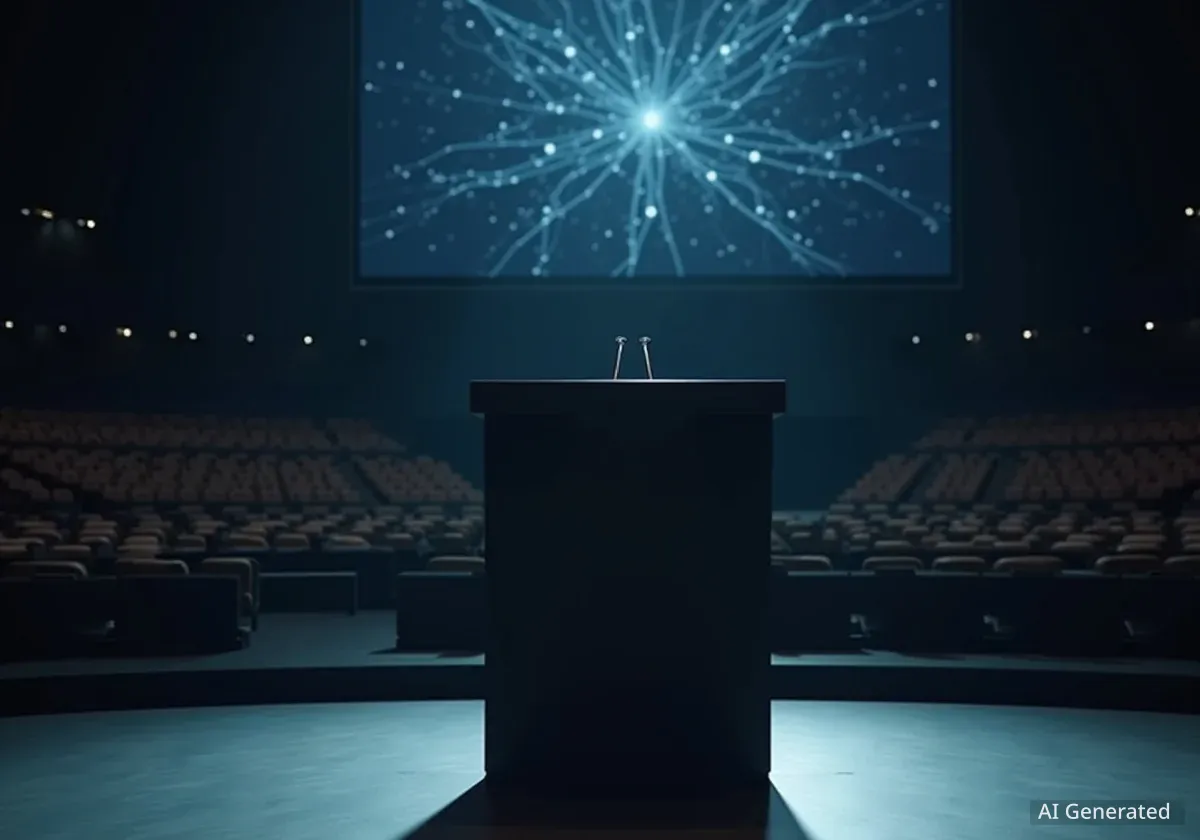Ukrainian President Volodymyr Zelenskyy delivered a stark warning to the United Nations General Assembly, stating that the world is entering the most dangerous arms race in history, driven by artificial intelligence. He cautioned that fully autonomous weapons systems could soon become a reality, fundamentally changing the nature of conflict.
His address on Wednesday highlighted the immediate threats posed by autonomous drones and the potential for warfare conducted without direct human involvement. The speech occurred amid rising tensions in Europe and a notable shift in the U.S. political landscape regarding the war in Ukraine.
Key Takeaways
- President Zelenskyy warned the UN that an AI-driven arms race is underway, calling it the most destructive in history.
- He predicted the near-future emergence of fully autonomous drones fighting each other and targeting infrastructure without human intervention.
- The warning comes as Russian drone activity near NATO borders increases regional tensions.
- Former U.S. President Trump has shifted his stance, now suggesting Ukraine can reclaim all its territory.
Zelenskyy Details Threat of Autonomous Warfare
Speaking at the 80th session of the U.N. General Assembly, President Zelenskyy painted a grim picture of future conflicts. He argued that the rapid development of artificial intelligence is fueling a new and unprecedented global arms race.
He emphasized that this technological shift is not a distant possibility but an imminent threat. The Ukrainian leader described a scenario where autonomous systems would make life-or-death decisions on the battlefield.
"It's only a matter of time, not much, before drones are fighting drones, attacking critical infrastructure and targeting people all by themselves, fully autonomous and no human involved, except the few who control AI systems," Zelenskyy stated.
This development, he argued, marks a dangerous new chapter in military history.
The New Arms Race
Zelenskyy explicitly framed the current situation as a historical turning point in global security. He distinguished the AI arms race from previous military buildups, such as the nuclear race of the 20th century, due to its accessibility and the speed of its evolution.
"We are now living through the most destructive arms race in human history because this time, it includes artificial intelligence," he told the assembly. The concern is that AI weaponry could proliferate more easily than nuclear technology, creating instability worldwide.
Background: The War in Ukraine
Russia's full-scale invasion of Ukraine has been ongoing for three and a half years. The conflict has become a testing ground for modern military technologies, including various types of drones, electronic warfare, and intelligence gathering systems, providing a real-world backdrop for Zelenskyy's warnings about future autonomous conflict.
Heightened Tensions Across Europe
The Ukrainian president's speech was delivered against a backdrop of increasing anxiety in Eastern Europe. Recent incidents involving Russian drones entering the airspace of NATO member states have amplified fears that the conflict could expand beyond Ukraine's borders.
Zelenskyy suggested that these incursions are part of a deliberate strategy by Moscow to test Western resolve and destabilize the region. He positioned his country as being on the front line of a broader confrontation.
"Ukraine is only the first and now Russian drones are already flying across Europe, and Russian operations are already spreading across countries, and Putin wants to continue this war by expanding it," he said.
Drone Incursions
Several eastern NATO members have reported violations of their airspace by Russian drones in recent months. These events have triggered diplomatic protests and raised questions about the appropriate response under the alliance's collective defense principle.
Trump Signals Major Shift in Ukraine Policy
Just one day before Zelenskyy's address, former U.S. President Donald Trump indicated a significant change in his position on the war's potential outcome. In a post on his Truth Social platform, Trump expressed new confidence in Ukraine's ability to achieve a complete military victory.
"I think Ukraine, with the support of the European Union, is in a position to fight and WIN all of Ukraine back in its original form," Trump wrote. He cited Russia's economic difficulties and a better understanding of the military situation as reasons for his revised outlook.
A Reversal of Previous Statements
This new stance represents a clear departure from views previously expressed by his administration. In the past, the prevailing idea was that a peace settlement would likely require Ukraine to concede territory to Russia, including Crimea, which Moscow annexed in 2014.
The policy shift suggests a potential alignment with the Ukrainian government's stated goal of liberating all internationally recognized territories. This development could have significant implications for future U.S. foreign policy regarding the conflict.
Meetings and NATO Implications
The policy change coincided with a meeting between Trump and Zelenskyy on the sidelines of the U.N. General Assembly on Tuesday. The discussions focused on the ongoing conflict and international support for Ukraine.
During the event, a reporter asked Trump if he believed NATO members should shoot down Russian aircraft that violate their airspace. His response was direct and unambiguous.
"Yes, I do," the U.S. president replied.
This statement reinforces a hardline stance on protecting NATO territory and could signal a more aggressive posture toward Russian military provocations in the region. The combination of his support for Ukraine's total victory and his firm position on NATO airspace defense marks a pivotal moment in the international response to the war.





